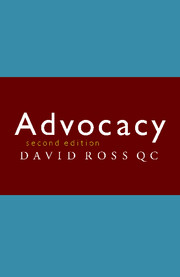Book contents
- Frontmatter
- Contents
- Foreword
- 1 The nature of advocacy
- 2 Preparation
- 3 Witnesses and questions
- 4 Examination-in-chief
- 5 Cross-examination: its qualities
- 6 Cross-examination: method and style
- 7 Cross-examination of experts
- 8 Cross-examination on documents
- 9 Re-examination
- 10 Admissibility, objections and submissions
- 11 The addresses
- 12 Plea in mitigation
- 13 Appeals
- 14 Legal writing
- 15 Etiquette and ethics
- Index
10 - Admissibility, objections and submissions
Published online by Cambridge University Press: 31 January 2011
- Frontmatter
- Contents
- Foreword
- 1 The nature of advocacy
- 2 Preparation
- 3 Witnesses and questions
- 4 Examination-in-chief
- 5 Cross-examination: its qualities
- 6 Cross-examination: method and style
- 7 Cross-examination of experts
- 8 Cross-examination on documents
- 9 Re-examination
- 10 Admissibility, objections and submissions
- 11 The addresses
- 12 Plea in mitigation
- 13 Appeals
- 14 Legal writing
- 15 Etiquette and ethics
- Index
Summary
Admissibility
[10000] Evidence is relevant and admissible if it increases or diminishes the probability of the existence of a fact in issue or of a fact behind a fact in issue. The adjectives used to describe such evidence are “relevant” and “probative”. Irrelevant evidence is inadmissible.
[10005] Relevant evidence will not be received by a court:
If its reception is forbidden by law.
If there is an accepted objection such as public interest immunity or legal professional privilege.
If its prejudicial effect outweighs its probative value.
If the probative value is so low as not to justify the time convenience and cost of its proof.
If the bad conduct of an opponent's witness makes the reception contrary to public policy such as the police acting improperly to induce a confession.
[10010] The test that a court uses to decide admissibility is not some form of mathematical calculation. As we know, judges are human beings. Of course, mathematicians are human beings too, but mathematics is not based on human affairs and court cases are. The complex events in a court case make it difficult for an advocate to arrive at a clear formulation of the standard for admissibility. Even if that formulation could be made, assessing how it would apply in a given case is no easy task. The reason for the difficulty is that the test for relevance is “logic and experience”.
[10015] In R v Matthews Schreiner JA said:
Relevancy is based upon a blend of logic and experience lying outside the law. The law starts with this practical or commonsense relevancy and then adds material to it or, more commonly, excludes material from it, the resultant being what is legally relevant and therefore admissible.
- Type
- Chapter
- Information
- Advocacy , pp. 108 - 118Publisher: Cambridge University PressPrint publication year: 2007

